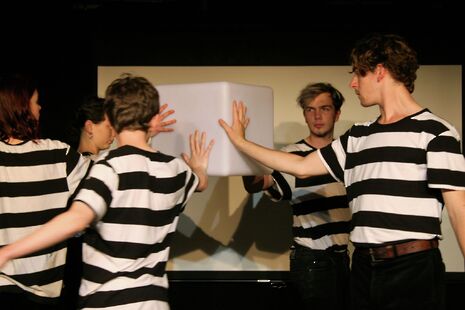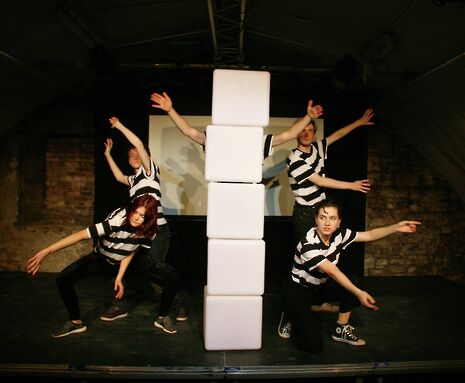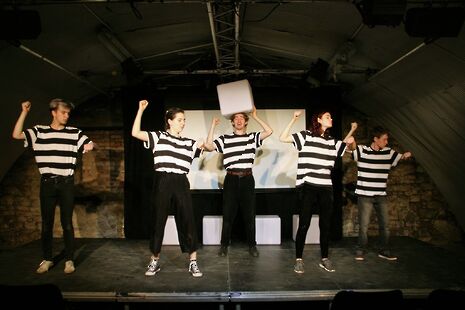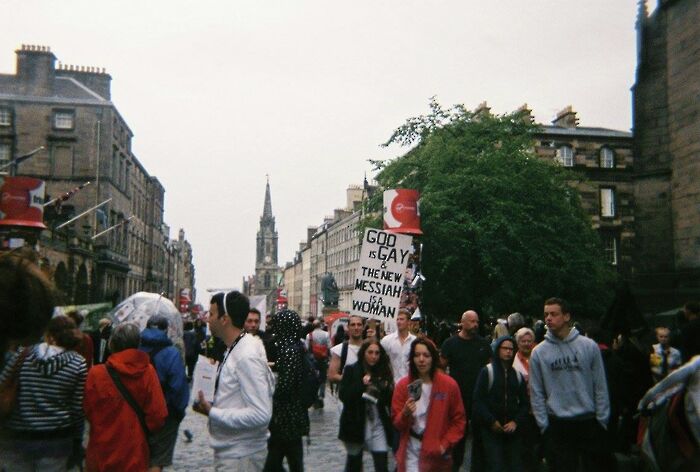Speechless review
Set in a world of silent comedy, this inventive and subtly-acted sketch show deserves the highest possible praise

It is said that at Cambridge, you are never more than 100 metres from a sketch comedy actor. Whilst I doubt this is true (50, perhaps?), Speechless manages to be a show that successfully distinguishes itself from the crowd yet isn't content with merely being different.
The final sketch is probably the funniest I’ve ever seen done by a student act and worth paying the ticket price for alone
The first unusual thing you notice about this sketch show is the unifying theme tying all the different skits together: that is, it actually exists. The narrative of such shows tends to be loose and barely defined, but here, a short introductory video attempts to set the scene: a dictatorial decree has banned comedic speech, forcing a band of actors to try and circumvent the totalitarian ruling by creating comedy without talking. The first sketch, with all five of the cast combining to make an irresistible beat from the mundane noises of the office, sets the stage more fully, and into a world of comedy sans conversation we, the audience, are thrown.
It would be tempting, perhaps, to over-act or throw subtlety to the wind in lieu of dialogue, but they resist falling into this trap
The opening sketch features one of the cast dabbing, with all the legitimacy one might expect of someone with the surname Allum-Gruselle. Dabbing can trace its origins back to the Atlanta hip-hop scene, and while Allum-Gruselle may lack street credibility on the streets of Fulton County, Georgia, he compensates with a sense of timing and arsenal of comic devices probably unrivalled in the entire Cambridge comedy scene. His every action is perfectly timed and engineered to elicit as much laughter as humanly possible, and the show is wise to make the most of his skills throughout.

The set is simple enough: 5 white cubes adorn the stage, and in one sketch they light up in a surprisingly elegant display. The transitions between sketches are very sharp, accompanied by a high tempo beat produced by Saville-Ferguson. This helps bridge the pieces together, supporting the idea that each bit is part of a whole production, rather than being disjointed and dreamed up separately by different combinations of cast members.

Many of the sketches contain extended use of voiceovers. Whether or not this is strictly playing by the rules imposed at the beginning of the show is a matter of contention: on the one hand I think it’s extreme to expect five students to write and perform a show without a single word being uttered as if they had just graduated from clown school; on the other, it didn’t escape my notice that the best sketches tended to be the ones that were truly speechless.
The sketches are, in general, excellent, inventive and very different from anything you’d see on the Cambridge scene. Particular highlights included one exploring the morality of eating crisps, a life lived through French song; the audience interaction sketches are genuinely original but also well done. The final sketch is probably the funniest I’ve ever seen done by a student act and worth paying the ticket price for alone.
The acting is nuanced (it would be tempting, perhaps, to over-act or throw subtlety to the wind in lieu of dialogue, but they resist falling into this trap) and the cast work together very impressively. There is a difference, however, between straight and comic acting. Whilst Murdoch, Wright and Sefton clearly excel at the former, there’s something about the way Saville-Ferguson and Allum-Gruselle move across the stage, time their actions and work the audience that suggests they know more about the latter than the others. Their presence is missed in the few sketches that don't involve them.
Speechless isn't perfect. One or two of the sketches didn't produce many laughs (not from me at least). The introductory video is a bit amateurish. The ending video is a little self-indulgent, and one sketch, in my opinion, should probably have been cut. But it's so original, so brilliant at its best, and its status as an undeniably seminal production for modern-day student Cambridge theatre is so beyond doubt that I think it deserves the highest possible praise.
 News / Caius mourns its tree-mendous loss23 December 2025
News / Caius mourns its tree-mendous loss23 December 2025 Comment / Yes, I’m brown – but I have more important things to say22 December 2025
Comment / Yes, I’m brown – but I have more important things to say22 December 2025 News / Clare Hall spent over £500k opposing busway 24 December 2025
News / Clare Hall spent over £500k opposing busway 24 December 2025 Interviews / Politics, your own way: Tilly Middlehurst on speaking out21 December 2025
Interviews / Politics, your own way: Tilly Middlehurst on speaking out21 December 2025 News / King appoints Peterhouse chaplain to Westminster Abbey22 December 2025
News / King appoints Peterhouse chaplain to Westminster Abbey22 December 2025









